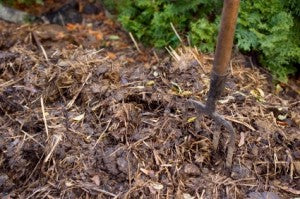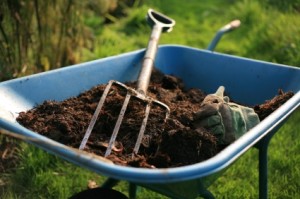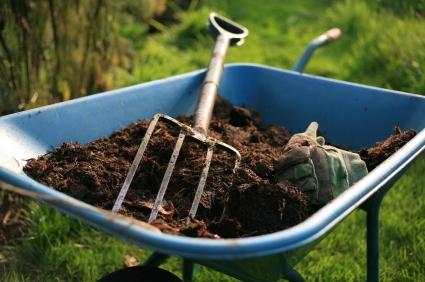Composting: The Other Black Gold pt 2
You’ve read the first part of our composting series,
Composting: The Other Black Gold, now you’re ready for some more details.

A Note on Using Manure or Feces
Is all poop created equal? Technically any fecal matter can eventually be used as a fertilizer, but should be composted first. However, when incorporating brown organic matter into your compost don’t use human, dog, cat, or pig feces because these types of fecal matter frequently carry pathogens and parasites. When you’re making compost to use in growing edibles, it’s best to stick with waste from herbivores like rabbits, sheep, goat, horse, or cow manure. Here’s a simple
explanation of why.
Turning your compost pile
When you’re building your compost pile, keep in mind that you’ll have to turn that stuff over. You’ll also want to be rotating out the finished compost. Don’t build it bigger than you can manage. The best height for your compost pile(s) is between 3 to 5 cubic feet. It all depends a lot on what
you’ll be able to turn – don’t make it too big! We recommend making multiple piles; that’ll make your timing and turning a lot easier.
When you’re turning compost, remember that the point is to bring stuff from the outside (edges) in. It will decompose without you turning it, but it will take a lot longer – often up to a year! Turning the compost introduces oxygen, which helps it break down.
Don’t turn your compost pile more than every two weeks. When organic matter decomposes, it builds up heat, which is part of the breaking-down process. If you turn the pile too frequently, this heat is lost and the whole composting process takes a lot longer. Since the point is to get compost onto your garden as soon as possible, turning every two to four weeks is ideal.
If you're looking to speed up the composting process, consider adding composting activators. Many are manufactured, and a few you can make or grow yourself. If you're putting in the right balance of green and brown organic matter (ie nitrogen and carbon), and building the pile correctly, then you don't really
need a composting activator. But if you do want to hurry up the decomposition go ahead and use one, with this caution: because you're adding nitrogen you'll probably notice an increase in odor.

How do you know when your compost is ready?
According to
this article by the University of Illinois, “compost is ready to use when it is dark brown, crumbly and has an earthy odor. Compost should be fluffy, but not powdery. The original materials that were put into the compost pile should not be recognizable, except for small pieces of stems.” This should take about three months, depending on what
kind of composting you’re doing.
Composting is a wonderful way to cut down on waste, create your own fertilizer, and increase your garden’s production. Come harvest time you’ll Replace that your table scraps were worth their weight in gold!
Happy composting!




